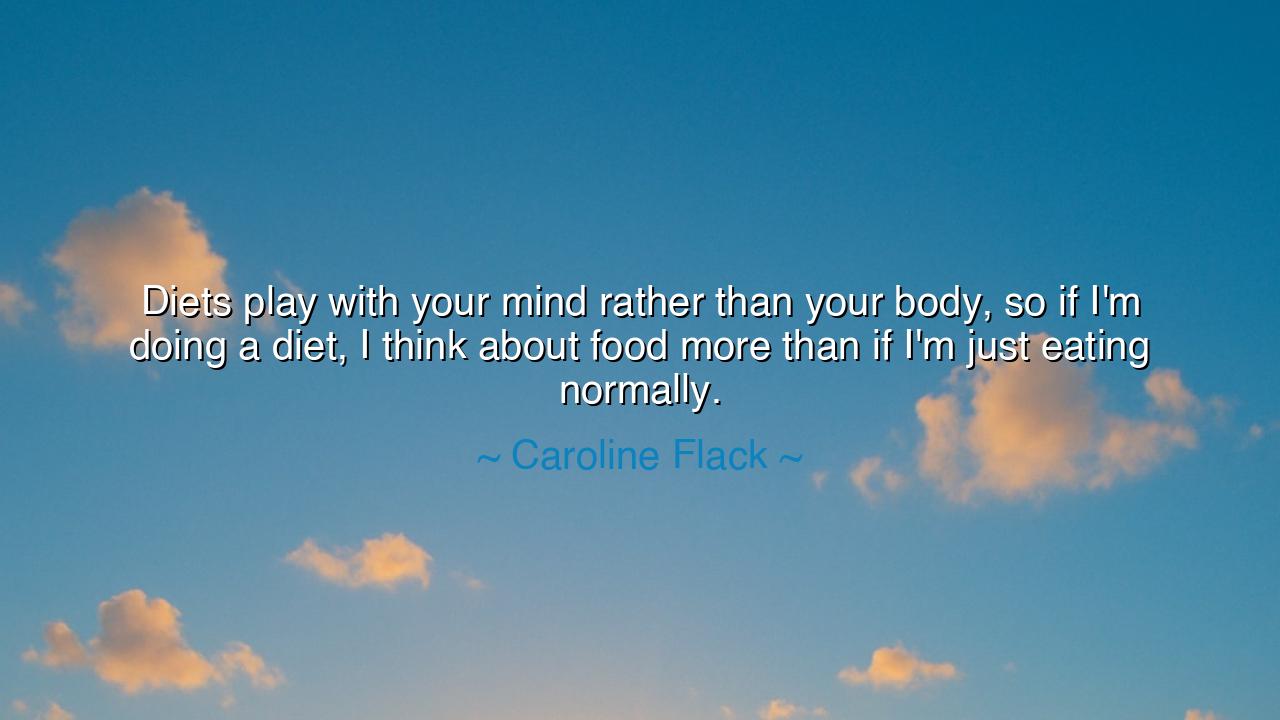
Diets play with your mind rather than your body, so if I'm doing
Diets play with your mind rather than your body, so if I'm doing a diet, I think about food more than if I'm just eating normally.






In the voice of Caroline Flack, we hear a truth both tender and piercing — a revelation not of the body, but of the mind: “Diets play with your mind rather than your body, so if I’m doing a diet, I think about food more than if I’m just eating normally.” Her words, though simple, echo with ancient wisdom — for they speak of the eternal battle between discipline and desire, between the control we impose upon ourselves and the freedom our souls secretly crave. What she names is not mere hunger of the flesh, but the turmoil of thought that arises when one tries too hard to tame what should instead be understood.
For what is a diet, if not a modern ritual of restraint — a promise to oneself that often turns into a prison? The ancients too knew this paradox. The philosophers of Greece practiced moderation, not deprivation, for they understood that the human spirit withers under extremes. When Caroline Flack says that diets play with the mind, she reveals how the act of constant self-denial does not purify, but magnifies obsession. The more we forbid ourselves from thinking of food, the more it dominates our thoughts; the more we strive for control, the more enslaved we become to the idea of control itself.
This truth can be found even in the story of Buddha. Before he attained enlightenment, Siddhartha starved himself for years, believing that liberation could only come through the denial of the body. But one day, weakened and near death, he realized that neither indulgence nor austerity leads to peace — that the Middle Path, the way of balance, is the only road to freedom. When he accepted a bowl of milk rice from a humble woman, he was not surrendering his quest; he was saving it. In that moment, he understood what Caroline would later echo centuries hence — that to live in constant resistance is to live in bondage, and that peace comes not from war against desire, but from harmony with it.
To “eat normally,” as she says, is to live in that balance — to honor the body’s rhythm without turning every bite into a battle. The ancients called this sophrosyne, the virtue of temperance — a calm mastery of self that allows one to enjoy life’s gifts without excess or guilt. A diet that consumes the mind is not wisdom but worry dressed in virtue’s clothing. It distracts the heart from joy, and the mind from clarity. For when one’s thoughts revolve endlessly around the forbidden, there is no room left for gratitude, no space left for grace.
Caroline’s words remind us, too, that food is not just nourishment but memory, emotion, and community. It binds families, marks celebrations, comforts the grieving, and sustains the weary. To turn food into a moral battlefield is to forget its sacred role in the story of life. The ancient Romans, who feasted not in gluttony but in reverence, would begin their meals with prayers to the household gods — thanking the earth, the harvest, and the divine for their sustenance. They understood what our age often forgets: that to eat with awareness and gratitude is itself a form of discipline — one far greater than any imposed rule or fleeting diet.
Her confession — that she thinks of food more when she is dieting — is a reflection of a universal human flaw: the mind’s rebellion against force. When the spirit feels confined, it begins to obsess over the very thing it is denied. The more we chase perfection, the further we drift from peace. This is not weakness; it is nature’s reminder that the mind, like the body, cannot thrive under punishment. The true art of health is not domination, but dialogue — listening to what the body asks and responding with kindness rather than command.
So let this be a lesson to those who seek balance: do not let your diet consume your mind. Eat with intention, but not with fear. Let your nourishment be guided by respect, not by rules. Remember that a calm heart digests better than an anxious one, and that self-love feeds the soul in ways no regimen ever can. As the sages once said, “Everything in moderation, including moderation itself.” To live well is to know when to strive, and when to surrender.
In her gentle honesty, Caroline Flack offers more than advice on food — she gives a teaching on life. She reminds us that obsession, even in the name of self-improvement, is still a form of suffering. The path to true health, both of body and mind, lies not in relentless control, but in mindful freedom. So eat when you are hungry, rest when you are tired, and let your thoughts be light. For the soul, like the stomach, was never meant to live on denial — but on balance, gratitude, and peace.






AAdministratorAdministrator
Welcome, honored guests. Please leave a comment, we will respond soon